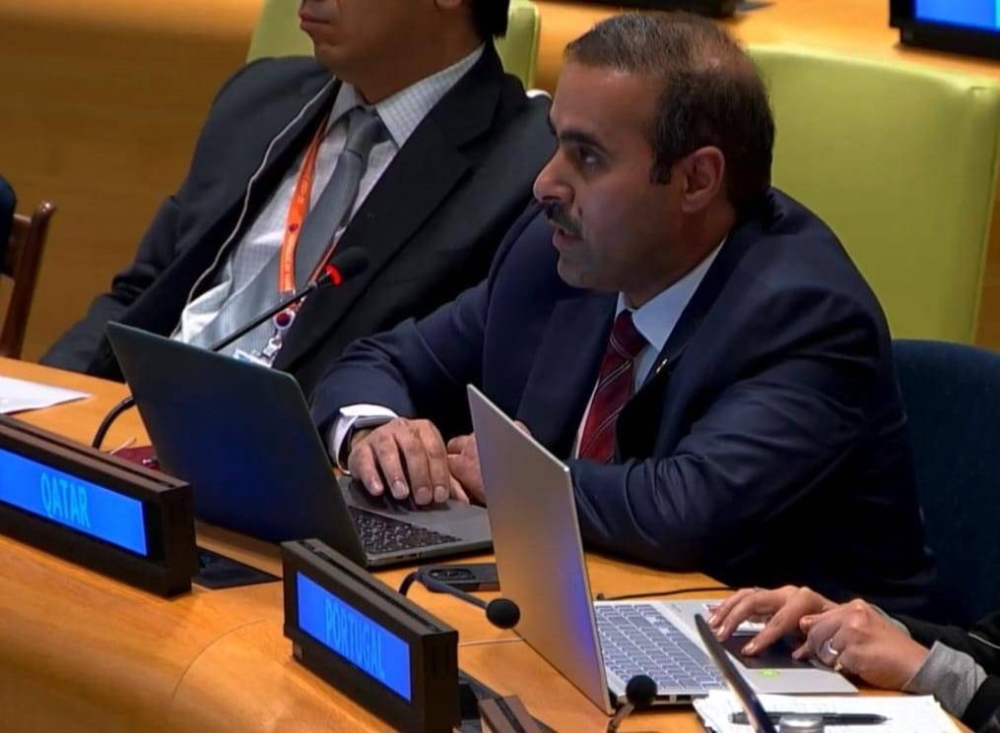Qatar has voiced its deep concern over the developments in the Gaza Strip and called on all parties to stop the fighting, reduce the escalation, exercise the utmost restraint, spare civilians the consequences of the fighting, and protect the region from sliding into a wider cycle of violence.
This came in a statement delivered by Saud Abdulaziz al-Kaabi, member of Qatar's delegation to the 78th session of the UN General Assembly, before the Sixth Committee on the Rule of Law at the National and International Levels at the UN headquarters in New York.
Al-Kaabi renewed Qatar's condemnation of the Israeli occupation's bombing of Al-Ahly Baptist Hospital in Gaza and considered it a brutal massacre as well as a heinous crime against defenceless civilians and a blatant violation of the provisions of international law and international humanitarian law.
He warned of the danger of adopting a policy of collective punishment including calls to depopulate the northern Gaza Strip, saying that forcing civilians to flee or seek refuge in neighbouring countries is a violation of international laws and would exacerbate the effects of the ongoing confrontations in the occupied Palestinian territories and double the suffering of the Palestinian people.
He urged the international community to take urgent action to open humanitarian corridors that allow international organisations to bring medical and food aid into Gaza and evacuate injured civilians.
Qatar believes that the principle of the rule of law is the basic foundation for the success of international efforts in achieving the goals and objectives for which the UN was established, and it is the main criterion for adherence to the UN Charter that emphasises equality, mutual respect and co-operation between countries and the establishment of a rules-based system in international relations management, he pointed out.
He noted that the international community has adopted many international conventions and declarations that emphasise the importance of the rule of law, including the 2005 World Summit Declaration, which stressed that the rule of law is an essential element of conflict prevention, peacekeeping, conflict resolution, peacebuilding, and safeguarding human rights.
The international community, he added, affirmed in the declaration on the celebration of the 75th anniversary of the UN its commitment that people must be the focus of efforts to achieve the rule of law at the national and international levels.
Qatar continues its commitment and efforts to strengthen the principle of the rule of law at all levels, he stated, pointing out that the State has paid great attention to ensuring integration between national laws and international instruments in the field of the rule of law.
In order to build effective, accountable and inclusive institutions at all levels, the leadership of Qatar established in 2013 the Rule of Law and Anti-Corruption Centre in Doha, which works in co-operation with national, regional and international institutions concerned with supporting the rule of law and good governance, especially the UN Office on Drugs and Crime, he said, adding the centre contributes to strengthening the principle of the rule of law and combating corruption through capacity building, training, technical assistance, and holding conferences and seminars.
He stressed the enlightening and awareness-raising role of the "Sheikh Tamim bin Hamad Al-Thani International Anti-Corruption Excellence Award" that was created in 2016 and aims to advocate the importance of fighting corruption as well as encourage the implementation of the decisive measures stipulated in the UN Convention against Corruption.
He also stressed Qatar's support for all efforts and activities to strengthen the rule of law in order to achieve justice and contribute to achieving the goals and objectives of the UN.

Al-Kaabi renewed Qatar's condemnation of the Israeli occupation's bombing of Al-Ahly Baptist Hospital in Gaza and considered it a brutal massacre as well as a heinous crime against defenceless civilians and a blatant violation of the provisions of international law and international humanitarian law.
